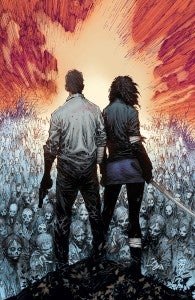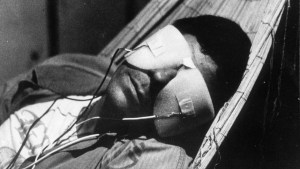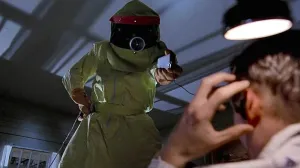Earlier today, Robert Kirkman joined ComicBook.com to talk about The Walking Dead, the long-running zombie apocalypse series he created which has spawned a hit TV series, a blockbuster video game series and which consistently outsells staples like Batman and The Avengers in the trade paperback and bookstore markets. Along with artists Tony Moore and (later and much more regularly) Charlie Adlard, Kirkman has generated the biggest, most successful new franchise in comics since the founding of Image Comics, of which Kirkman’s Skybound Studios is now a major part.If it seems that the intimate, day-to-day nature of the comic’s early days have been traded in for a more epic, widescreen take on the tale that’s friendly to the trade market and the burgeoning Walking Dead media empire, Kirkman says it’s not on purpose.”There’s not any real conscious change to how I tell the stories in the comic books but I guess over time my storytelling style has changed,” the writer told ComicBook.com. “It’s interesting to me sometimes to think about how, when the series started, I was 23 or 24 and now I’m a very different person–I didn’t have kids back then and now I’ve got a six-year-old and three-year-old, and I live in a different state. I’m almost 34 years old and I’m still doing the same comic. It’s been the same writer for this entire series but my life was vastly different. Those differences–you can’t help but have them creep into the story. I think it adds to the flavor of the series becuase I’m growing and changing over the life of the series.”Certainly fans over the years had questioned the degree to which his family life would change the tone of the story after he admitted in letter columns and interviews that as a parent it’s harder to do awful things to children in the book–but, almost to spite himself, the book has done just that a number of times, including one particularly notable example from which the cast still hasn’t recovered, and which he said in a recent Comic Book Resources interview still haunts him.It’s a book that’s consistently trying to reinvent itself, with a new twist every six or eight issues that leaves readers talking for months. A recent change has involved crafting a literally larger world for his character to exist in. Throughout the last ten years, the characters in The Walking Dead have struggled to survive as nomadic settlers in small camps, or occasionally by setting up larger (but still not particularly large) communities in which they could try to reacquire basic dignities like running water and fresh food. It’s only in the recent past that the characters have discovered that they aren’t unique–that there are several, possibly dozens or hundreds, of similar groups trying to re-establish some sense of order and community. It’s a high-risk, high-reward game for the characters to play and reflects a sense that, even starting at life and death, there are still ever-rising stakes in The Walking Dead.”The [TV] show has been so interesting and so popular thus far, it’s really interesting to me to think that season three is where we really get to the good stuff,” Kirkman said. “That this far in, going into season three and having so much more good stuff to go that people don’t know anything about if they’re just watching the show and haven’t read the comic.”










